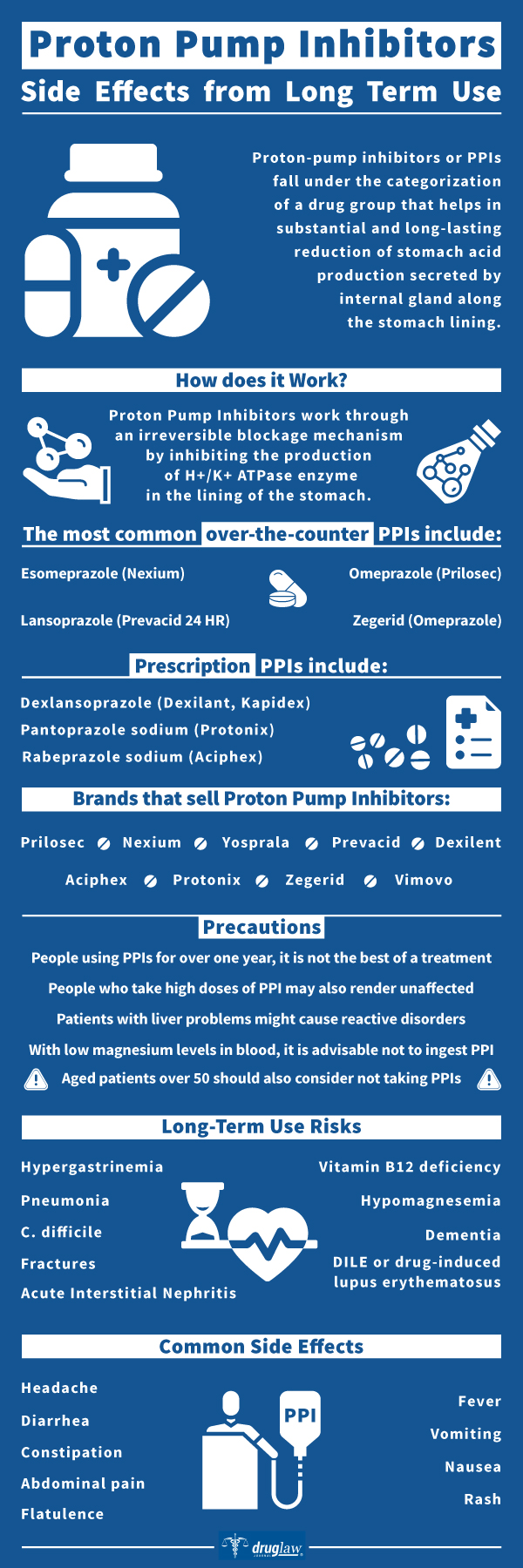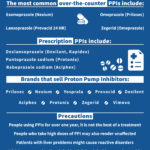Prescription Name and Overview
For patients suffering from chronic heartburn, Gastro-Esophageal Reflux Disease (GERD), ulcers, and other digestive disorders, the Proton Pump Inhibitor (PPI) quickly became a sensational centerpiece in the arsenal to combat painful stomach acid symptoms. Additionally, PPIs have enjoyed aggressive marketing by global drug manufacturing giants and have soared to annual market value in excess of $5.6 billion. Today, there are several types of PPIs on the market with some available either Over the Counter (OTC) or by prescription. Now, with several years of both prescription and OTC consumption documented, researchers and physicians are openly talking about the risks associated with long-term use of PPIs. Furthermore, their studies have engendered a more in-depth conversation about whether or not PPIs are necessary for the treatment of more common heartburn symptoms which can be addressed by other medications and or lifestyle changes.
Generic Name and Overview
There are several different brands and varieties of PPIs on the market in the United States:
Omeprazole (Prilosec)
Originally manufactured under patent by AstraZeneca, PLC – now in a generic format. Available OTC without a prescription
Esomeprazole (Nexium)
Originally manufactured under patent by AstraZeneca, PLC – now in a generic format. Available OTC without a prescription
Lansoprazole (Prevacid)
Originally manufactured under patent by Takeda Pharmaceutical Company – now in a generic format. Available OTC without a prescription.
Rabeprazole (AcipHex)
Originally manufactured under patent by Eisai Medical Research – now in a generic format.
Pantoprazole (Protonix)
Originally manufactured under patent by Pfizer, Inc. – now in a generic format.
Dexlansoprazole (Dexilant)
Originally manufactured under patent by Takeda Pharmaceutical Company – now in generic format.
Zegerid (Omeprasole with Sodium Bicarbonate)
Prescription format manufactured under patent by Salix Pharmaceuticals – now in a generic format. OTC version marketed by Merck & Co., under license.
Typical PPI Indications
- Esophageal duodenal and stomach ulcers
- NSAID-associated ulcers
- Ulcers
- GERD
- Zollinger-Ellison Syndrome
PPIs are also commonly prescribed in combination with antibiotics to combat Helicobacter pylori bacteria which are associated with ulcers of the stomach and duodenum.
What Is It Used For?
PPIs are designed to limit the production of digestive acid by blocking a key enzyme in the stomach wall. This stomach acid is a key component in the formation of many gastrointestinal tract ailments such as GERD and ulcers.
How Does it Work?
The core function of a PPI is to stop certain cells in the stomach lining from pumping or producing acid. Unlike other “on-demand” antacids or similar remedies which are taken for immediate relief of indigestion and heartburn, PPIs are taken and dissolved into the bloodstream where they circulate throughout the body. When they reach a specific type of acid-producing or “pumping” cell in the stomach lining, they act to “block” that cell from producing acid. PPIs are intended to be taken as part of a routine regimen that accrues over a four-to-twelve week period and is not recommended to provide immediate relief from heartburn or indigestion.
What are the Approved Uses?
The FDA-approved uses for PPIs in adults include healing of erosive esophagitis (EE); treatment of GERD; risk reduction for gastric ulcer (GU) associated with nonsteroidal anti-inflammatory drugs; Helicobacter pylori eradication; Zollinger-Ellison syndrome; and short-term treatment and maintenance of duodenal ulcers (DU). The dosages and therapeutic duration for PPIs will depend upon the particular PPI as not all PPIs are approved for all indications.
Production Anecdotes / History
Beginning in the mid-1970s, researchers began to notice that certain compounds, such as timoprazole were adept at stopping acid secretion in the digestive tract. Research continued in the field until 1979 when Omeprazole was discovered and a patent was issued. Patent-in-hand, AstraZeneca was the first pharmaceutical giant to run to the market with a prescription-based format for Omeprazole and marketed the drug under the name Prilosec. Prilosec was a huge runaway hit for AstraZeneca, bringing in over $26 billion in U.S. revenue alone while it was under patent. In 2001, AstraZeneca’s patent expired which allowed generic manufacturers to enter the market and drive the price of Omeprazole down substantially.
Faced with the prospect of one of its largest moneymakers falling “off-patent” AstraZeneca filed several lawsuits designed to keep generic manufacturers at bay while the company’s follow-up drug, Esomeprazole, was itself patented and cleared by the FDA. Marketed as Nexium or “The Purple Pill”, AstraZeneca’s new PPI was fundamentally the same drug as before – just with subtle changes to its profile, sufficient to allow for patenting and for marketing as an “alternative” to the now generic Omeprazole. The newly patented Nexium went on to generate an additional $48 billion in revenue for AstraZeneca between 2006 and 2015, despite materially being the same type of drug with the same benefits as the generic versions of Omeprazole. Generic versions of Nexium entered the market beginning in 2015.
Precautions
Common side effects from PPIs include:
- Headache
- Nausea, stomach pain or gas
- Constipation
- Diarrhea
- Rash
Long-Term Use Considerations
Recent research into the consequences of long-term use of PPIs have increasingly uncovered the potential for significant side effects including:
- Clostridium difficile (C. difficile) infection
- Dementia
- Pneumonia
- Interference with Antiplatelet Agents
- Kidney Disease
- Micronutrient Deficiency
- Reduced Bone Mineral Density
Drug Interactions
Patients taking PPIs and clopidogrel should be aware that the inhibition function of PPIs can cause clopidogrel to lose its effectiveness. Additionally, patients should consult their physicians before taking any PPI and the following medication:
- Viracept (Nelfinavir)
- Drugs containing rilpivirine
- Antifungal agents
- Digoxin
- Diazepam (Valium)
- Warfarin (Coumadin)
- Phenytoin (Dilantin)

Long-Term Side Effects
Kidney Injury and Disease
Kidneys perform an outsized role in maintaining the healthy balance and function of the human body by ensuring that harmful waste products are adequately filtered and removed. When that function is impaired, the body begins to suffer and other vital organs are compromised. The consequences of chronic kidney illness are long-lasting and dire for those who suffer from it.
According to a 2017 analysis of over two million patients over several case-control studies, it was observed that PPI users demonstrated a higher risk of developing acute kidney injuries and chronic diseases when compared against non-PPI users. Specifically, the researchers noted an increase in acute interstitial nephritis, which often goes untreated and developed into a more chronic kidney issue.
Prilosec Cancer and Nexium Cancer Concerns
Because GERD is a chronic condition and because so many people have taken PPIs like Prilosec and Nexium for so long (in some cases indefinitely) to control their symptoms, some experts and researchers have flagged long-term PPI use for potential increased cancer risk. In particular, some experts are concerned that PPIs may “mask” gastric cancer. Additionally, they have anxieties that long-term PPI use may cause polyps and atrophic gastritis.
Weakened and Broken Bones
In 2010, the FDA issued a warning communication citing research that showed patients who received higher doses of PPI medications over time are at greater risk for fractures of the hip, wrist, and spine. Furthermore, the FDA warned that users of PPIs at high dosage levels were at risk for loss of overall bone density.

Lawsuits
The first PPI lawsuits alleging kidney disease and injury started manifesting in 2016. One of the first victims to file suit was Charles Bowers, a Tennessee man who took Nexium from 2003-2008 until he was diagnosed with acute kidney disease. Mr. Bowers currently undergoes kidney dialysis 3 days a week while he awaits a kidney transplant. From there, individuals filing lawsuits naming PPI manufacturers like AstraZeneca (among others) have mushroomed considerably. Cases from across the country have now been merged into a single multidistrict litigation taking place in federal court in New Jersey (MDL-2789).
Sources Cited (24)
1) “The physiological background behind and course of development of the first proton pump inhibitor” https://pubmed.ncbi.nlm.nih.gov/25857639/
2) “Harvard Health Letter: Proton-pump inhibitors” https://www.health.harvard.edu/diseases-and-conditions/proton-pump-inhibitors
3) “MedlinePlus: Proton Pump Inhibitors” https://medlineplus.gov/ency/patientinstructions/000381.htm
4) “Healthline: Proton Pump Inhibitors” https://www.healthline.com/health/gerd/proton-pump-inhibitors#1
5) “The Safety of Appropriate Use of Over-the-Counter Proton Pump Inhibitors: An Evidence-Based Review and Delphi Consensus” https://www.ncbi.nlm.nih.gov/pmc/articles/PMC5357248/
6) “What you should know about: PPIs” https://www.health.harvard.edu/diseases-and-conditions/what-you-should-know-about-ppis#:~:text=PPIs%20work%20by%20inhibiting%20certain,over%20a%20period%20of%20time.
7) “Proton Pump Inhibitors: Use in Adults” https://www.cms.gov/Medicare-Medicaid-Coordination/Fraud-Prevention/Medicaid-Integrity-Education/Pharmacy-Education-Materials/Downloads/ppi-adult-factsheet11-14.pdf
8) “25 Years of Proton Pump Inhibitors: A Comprehensive Review” https://www.ncbi.nlm.nih.gov/pmc/articles/PMC5221858/
9) “Mayo Clinic: Omeprazole (Oral Route)” https://www.mayoclinic.org/drugs-supplements/omeprazole-oral-route/description/drg-20066836
10) “Mayo Clinic Proceedings: Proton Pump Inhibitors: Review of Emerging Concerns” https://www.mayoclinicproceedings.org/article/S0025-6196(17)30841-8/fulltext#:~:text=Although%20PPIs%20have%20had%20an,chronic%20kidney%20disease%2C%20and%20dementia.
11) “The risks of long-term use of proton pump inhibitors: a critical review” https://www.ncbi.nlm.nih.gov/pmc/articles/PMC6463334/
12) “Advantages and Disadvantages of Long-term Proton Pump Inhibitor Use” https://www.ncbi.nlm.nih.gov/pmc/articles/PMC5885718/
13) “Pharmacokinetic Drug Interaction Profiles of Proton Pump Inhibitors: An Update” https://www.ncbi.nlm.nih.gov/pmc/articles/PMC3975086/
14) “Drug-drug interaction profiles of proton pump inhibitors” https://pubmed.ncbi.nlm.nih.gov/20608754/
15) “Proton Pump Inhibitors: Considerations With Long-Term Use” https://www.uspharmacist.com/article/proton-pump-inhibitors-considerations-with-longterm-use
16) “FDA Drug Safety Communication: Possible increased risk of fractures of the hip, wrist, and spine with the use of proton pump inhibitors” https://www.fda.gov/drugs/postmarket-drug-safety-information-patients-and-providers/fda-drug-safety-communication-possible-increased-risk-fractures-hip-wrist-and-spine-use-proton-pump#:~:text=FDA%20has%20determined%20an%20osteoporosis,dose%20PPI%20use%20is%20unlikely.
17) “FDA Drug Safety Communication: Low magnesium levels can be associated with long-term use of Proton Pump Inhibitor drugs (PPIs)” https://www.fda.gov/drugs/drug-safety-and-availability/fda-drug-safety-communication-low-magnesium-levels-can-be-associated-long-term-use-proton-pump
18) “Forbes Magazine: Hard to Swallow” https://www.forbes.com/forbes/2002/0513/199.html#3a838e544282
19) “American Council on Science and Health: Nexium: The Dark Side Of Pharma” https://www.acsh.org/news/2017/01/18/nexium-dark-side-pharma-10546
20) “Is the concomitant use of clopidogrel and Proton Pump Inhibitors still associated with increased adverse cardiovascular outcomes following coronary angioplasty?: a systematic review and meta-analysis of recently published studies (2012 – 2016)” https://www.ncbi.nlm.nih.gov/pmc/articles/PMC5221663/#:~:text=Because%20PPIs%20can%20act%20as,increase%20in%20adverse%20clinical%20outcomes.
21) “Harvard Medical School – Trends in Medicine: The Link Between Proton Pump Inhibitors and Kidney Disease” https://trends.hms.harvard.edu/2017/04/27/the-link-between-proton-pump-inhibitors-and-kidney-disease/#:~:text=In%20a%20recent%20meta%2Danalysis,1.07%2D1.72%2C%20respectively).
22) “Association of Long-term Proton Pump Inhibitor Therapy with Bone Fractures and effects on Absorption of Calcium, Vitamin B12, Iron, and Magnesium” https://www.ncbi.nlm.nih.gov/pmc/articles/PMC2974811/
23) “Harvard Women’s Health Watch: By the way, doctor: Does long-term use of Prilosec cause stomach cancer?” https://www.health.harvard.edu/diseases-and-conditions/by_the_way_doctor_does_long-term_use_of_prilosec_cause_stomach_cancer#:~:text=This%20has%20raised%20some%20concerns,increased%20risk%20for%20stomach%20cancer.
24) “FDA Warns About Bone Breaks And Heartburn Drugs” https://www.npr.org/sections/health-shots/2010/05/26/127132723/fda-warns-about-bone-risks-from-heartburn-drugs



